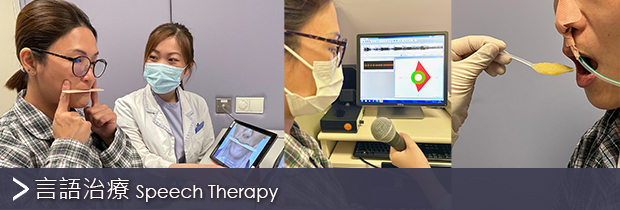Introduction
Speech Therapy Department mainly provides consultation and intervention to patients with communication and swallowing problems.
Target service groups include patients suffering from:
- Dysphagia and Feeding Problem
- Neurological Communication Disorders
- Voice Disorders
Scope of Service
Speech Therapy Service at Pok Oi Hospital includes:
- In-patient service
- Out-patient service
- Geriatric Day Hospital service
- Videofluoroscopic Swallowing Study(VFSS)
- Fiberoptic Endoscopic Evaluation of Swallowing(FEES)
- Voice clinic
- Stroke program
- Staff clinical training program, e.g. Feeding skills training workshop
Service Targets
Dysphagia and Feeding Problem
- Dysphagia refers to all kinds of swallowing and feeding difficulties which can be resulted from stroke (ischaemic or haemorrhagic), brain tumor, encephalitis, degenerative diseases (e.g. Parkinsonism, dementia), muscular dystrophy, myasthenia gravis, cerebral palsy, cleft lips and palate, head and neck cancer, glossectomy, laryngectomy, oesphagectomy etc.
- Tracheostomy may affect patient’s swallowing ability.
- Careful Hand Feeding management for patients under end-of-life care.
- Dysphagia may lead to aspiration pneumonia, malnutrition, dehydration, weight loss or even suffocation.
- Patients with dementia may have behavioural feeding problem.
Neurological Communication Disorders
- Neurological Communications Disorders are communication disorders resulted from brain-related diseases. For example, stroke (ischemic or hemorrhagic), brain injury, brain tumor, encephalitis, degenerative diseases (e.g. Parkinsonism, dementia).
- Neurological Communication Disorders include: aphasia, apraxia of speech, dysarthria and cognitive communication disorders.
Voice Disorders
- Patients with voice disorders may have hoarseness, phonation break, pitch break, strained voice, improper pitch control and improper loudness control. Causes of voice disorders include vocal abuse, vocal cord trauma, psychogenic factors, ineffective phonation methods, neurological diseases etc. Common vocal pathologies are vocal nodules, vocal cord edema, vocal cord polyps, vocal cord palsy.
- The ability to phonate will be affected after tracheostomy.
- Laryngectomees are patients who have their voice box removed. Speech Therapists will teach laryngectomees to use different methods to phonate, for example, electrolarynx, pneumatic speaking aids, oesophageal speech.
Speech Therapist’s Role in Management of Dysphagia
- Assess swallowing function (oral and pharyngeal phase).
- Recommend suitable diet textures and fluid consistency.
- Educate caregivers about safe feeding techniques.
Speech Therapist’s Role in Management of Communication Disorders / Voice Disorders
- Restore communication ability for patients.
- Tailor-make alternative and augmentative communication tools for individual patients.
- Educate caregivers about tactics to communicate with patients who have communication disorder.
- Introduce effective phonation methods to suitable patients.
Appointment Procedures
For in-patient: accept medical referral only
For out-patient: please bring medical referral and go to the Integrated Allied Health Departments Information & Reception counter, 1/F, Pok Oi Hospital
Service Hours
In-patient Service
| Monday to Friday |
9:00 am to 12:30 pm 1:30 pm to 5:00 pm |
|---|---|
| Saturday | 9:00am – 1:00pm |
Out-patient Service (1/F, Pok Oi Hospital)
| Monday, Tuesday & Friday | 1:30pm – 5:00pm |
|---|---|
| Wednesday & Thursday | 9:00am – 12:30pm |
Contact Us
| Telephone: | 2486 8113 |
|---|












